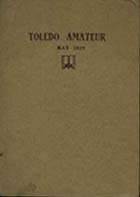Difference between revisions of "Toledo Amateur"
| (5 intermediate revisions by the same user not shown) | |||
| Line 1: | Line 1: | ||
| + | [[Image:Toledo_Amateur_brown_copy.jpg|right]] | ||
The '''Toledo Amateur''' was an amateur press publication by Wesley Hilon Porter, later joined by Madelaine R. Voigt. | The '''Toledo Amateur''' was an amateur press publication by Wesley Hilon Porter, later joined by Madelaine R. Voigt. | ||
| − | ''Toledo Amateur'' was first published in the 1910s for the United Amateur Press Association of America. | + | ''Toledo Amateur'' was first published in the mid-1910s for the United Amateur Press Association of America. |
| − | Contributors included Margarite Allen, Edgar Ralph Cheney, Edna von der Heide ([[The Inspiration]]), James J. Hennessey, Dora M. Hepner, | + | Contributors included Margarite Allen, Edgar Ralph Cheney, Edna von der Heide ([[The Inspiration]]), James J. Hennessey, Dora M. Hepner, Olive G. Owen, Addie L. Porter, Mary Margaret Sisson, Emma Marie Voigt, and David H. Whittier. |
| − | [[H. P. Lovecraft]] | + | [[H. P. Lovecraft]], in his review in the March 1917 issue of ''The United Amateur'', notes; ''"Toledo Amateur for October is a literary publication which reflects much credit upon its young editor, Mr. Wesley Hilon Porter, and upon the several contributors."'' |
| − | Later that same year, Lovecraft would begin contributing to ''Toledo Amateur'' with his satirical article, "On the Death of a Rhyming Critic" appearing in the July 1917 issue. In May 1919, his poem, ''Amissa Minerva'' would also appear, a systematic attack on modern poetry. | + | Later that same year, Lovecraft would begin contributing to ''Toledo Amateur'' with his satirical article, "On the Death of a Rhyming Critic" appearing in the July 1917 issue. In May 1919, his poem, ''Amissa Minerva'' would also appear, a systematic attack on modern poetry. |
| + | |||
| + | As a critic of poetry, Lovecraft was unflinching, and as reviewer for all the publications issued by The United Amateur Press Association of America, he wasn't always popular. Writing in the November 1920 issue of ''Toledo Amateur'', Dora Moitoret asks, " Is Howard Lovecraft striving to imitate Edgar Allan Poe? If so, he seems to be succeeding. When he departs from his rather scathing and totally biased reports from the bureau of critics, and from his lengthy verse in heroic couplets, to delve into original prose composition, he goes the limit, never deigning to stop until he has succeeded in creating goosepimples, cold chills and nervous tremors. This may be successful composition; we hope it is. But it is too terrible." | ||
[[Category:Zine]] | [[Category:Zine]] | ||
Latest revision as of 13:49, 17 July 2011
The Toledo Amateur was an amateur press publication by Wesley Hilon Porter, later joined by Madelaine R. Voigt.
Toledo Amateur was first published in the mid-1910s for the United Amateur Press Association of America.
Contributors included Margarite Allen, Edgar Ralph Cheney, Edna von der Heide (The Inspiration), James J. Hennessey, Dora M. Hepner, Olive G. Owen, Addie L. Porter, Mary Margaret Sisson, Emma Marie Voigt, and David H. Whittier.
H. P. Lovecraft, in his review in the March 1917 issue of The United Amateur, notes; "Toledo Amateur for October is a literary publication which reflects much credit upon its young editor, Mr. Wesley Hilon Porter, and upon the several contributors."
Later that same year, Lovecraft would begin contributing to Toledo Amateur with his satirical article, "On the Death of a Rhyming Critic" appearing in the July 1917 issue. In May 1919, his poem, Amissa Minerva would also appear, a systematic attack on modern poetry.
As a critic of poetry, Lovecraft was unflinching, and as reviewer for all the publications issued by The United Amateur Press Association of America, he wasn't always popular. Writing in the November 1920 issue of Toledo Amateur, Dora Moitoret asks, " Is Howard Lovecraft striving to imitate Edgar Allan Poe? If so, he seems to be succeeding. When he departs from his rather scathing and totally biased reports from the bureau of critics, and from his lengthy verse in heroic couplets, to delve into original prose composition, he goes the limit, never deigning to stop until he has succeeded in creating goosepimples, cold chills and nervous tremors. This may be successful composition; we hope it is. But it is too terrible."
